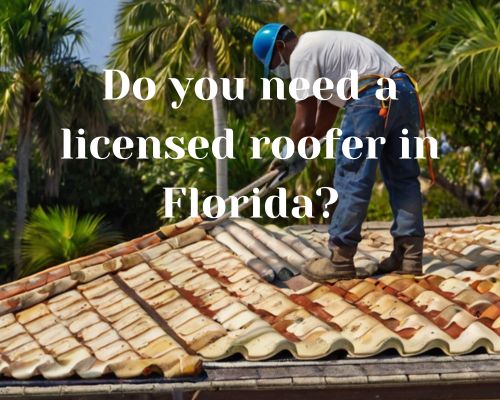Are you in Florida and wondering if you need a licensed roofer for your next roofing project? The rules in the Sunshine State are clear and stringent.
If you’re performing almost any form of roofing work, you need a licensed roofing contractor. This ensures that the work meets high standards and protects you from potential liability issues.

Licensed roofers in Florida must pass rigorous exams, including the General Trade Knowledge exam and the Business & Finance exam.
They also need to provide proof of insurance, including Public Liability and Property Damage Insurance, along with Worker’s Compensation Insurance.
This regulatory framework ensures you get quality service backed by expertise and insurance coverage.
Choosing a licensed roofer like Star Roofing West Palm Beach, not only guarantees that your roofing project complies with Florida’s legal standards, but it also provides peace of mind knowing that the roofer is experienced and insured.
This reduces your risk and potential costs from accidents or substandard work.
Florida Roofing License Requirements
To legally work as a roofer in Florida, you need to meet several specific requirements.
Licensing Process
To become a licensed roofer in Florida, you must first register with the Department of Business and Professional Regulation (DBPR).
You’ll need to complete an application and undergo a background check.
A key part of this process is passing both a Business and Finance exam and a Trade-specific exam.
Additionally, you must demonstrate at least four years of roofing experience or a combination of education and experience.
Completing these steps ensures you meet the criteria set by the Construction Industry Licensing Board (CILB).
Business and Insurance Regulations
In Florida, all licensed roofers must obtain specific insurance policies to ensure financial responsibility.
You will need General Liability Insurance with at least $100,000 in coverage and Property Damage Insurance with a minimum of $25,000 in coverage.
Additionally, if you have employees, Workers’ Compensation Insurance is mandatory.
This protects your workers in case of injuries on the job.
Meeting these insurance requirements is crucial to protect both your business and your clients.
Compliance with Building Standards
As a licensed roofer, you must comply with the Florida Building Code, just what like Star Roofing West Palm Beach does.
This includes following standards related to materials, design, and safety.
Roofing projects must be inspected to ensure they meet these codes, and failure to adhere can result in penalties.
Moreover, regular updates to the building code mean you must stay informed about changes to maintain compliance.
This ensures that your work consistently meets state standards, enhancing both the safety and durability of the roofing projects you undertake.
Continuing Education and Trade Knowledge
Continuing education and trade knowledge are essential for maintaining licensure and advancing roofing techniques in Florida.
Maintaining Licensure
Florida mandates that licensed roofing contractors complete 14 hours of continuing education every two years.
For Certified Roofing Contractors (CCC), the deadline is August 31 of even years. For Registered Contractors (RC), it’s August 31 of odd years.
This ongoing education includes courses on Industry Standards, Good Moral Character, and practical knowledge updates.
Organizations like the Gold Coast School of Construction offer comprehensive programs that help in meeting these requirements efficiently.
License Renewal involves submitting proof of completed education to the state licensing board.
Always check with your Local Jurisdiction for any additional local mandates.
Advancement of Roofing Techniques
Keeping up-to-date with the latest advancements in the Roofing Industry is crucial.
This includes knowledge of modern Engineering, materials like Asphalt, Shingle, Tile, and Metal Roofs.
Mastery in these areas allows you to offer innovative solutions for Residential Roofing and Commercial Roofing projects.
Courses and workshops on Roofing Experience and Trade Knowledge are frequently available.
They cover emerging technologies and methods, such as solar integration and eco-friendly materials.
Certifications from reputed institutions further enhance your expertise, ensuring you remain competitive and effective in your trade.